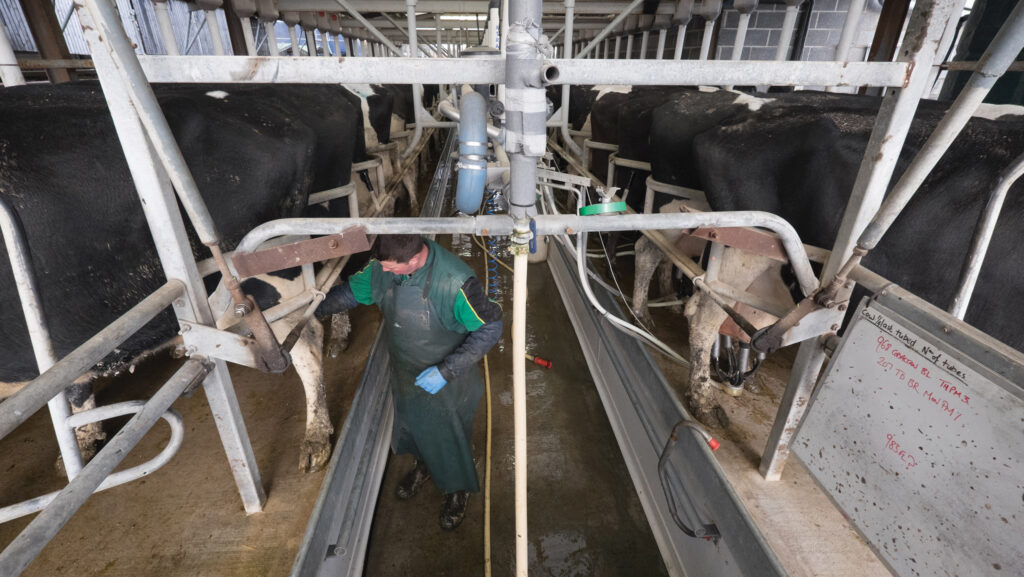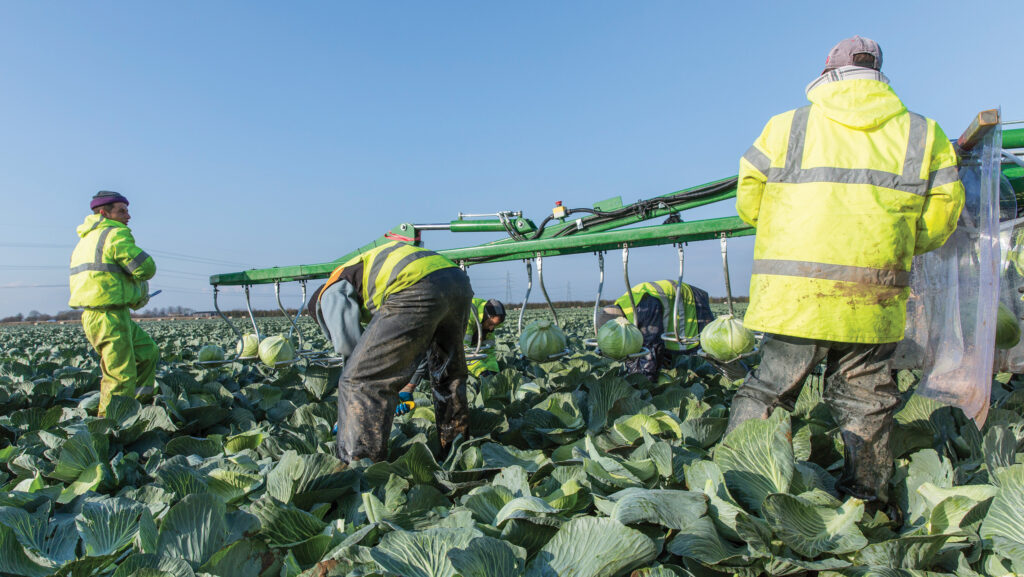Options for employing farm staff from overseas
 © Tim Scrivener
© Tim Scrivener International workers continue to meet the labour needs of UK agriculture post-Brexit, even though the government has made it more costly to use this employment route.
Gemma Robinson, who leads the business immigration practice at law firm Foot Anstey, says overseas recruitment levels in agriculture remain consistent despite often high upfront fees for both the business and the new recruit.
As well as a sponsorship licence fee and other visa-related costs if recruiting through the skilled worker visa option, there is now a minimum salary of £38,700 to consider.
Gemma gives her advice on the three main visa routes that farm businesses can consider for their recruitment needs.
See also: How to check right to work status to avoid hefty penalties
Skilled worker visa
Britain currently offers skilled worker visas that allow non-settled citizens to work in England, Scotland, Wales and Northern Ireland for up to five years at a time.
This route enables recruitment of migrants into a long-term skilled role – at farm manager or stock manager level, for example.
Candidates must be sufficiently skilled and have qualifications mostly at A-level standard or higher.
Minimum salary requirement
In April 2024, in an effort to cut net migration, the previous government dramatically increased the minimum salary threshold from £26,200 a year to £38,700, or the job’s standard “going rate” – whichever is higher.
There are also a couple of ways that migrants can be paid less, explains Gemma.
The most used category in the agricultural sector is for those under 26 years old, or who are studying, or a recent graduate or are in professional training at the time of their visa application.
For this category in the early stages of their career, the minimum salary threshold is at least £30,960 a year or 70% of the job’s standard going rate.
Those minimum rates apply to all sectors and can be a barrier to recruitment in agriculture, especially in some parts of the UK where salaries are much lower, says Gemma.
“I have had conversations with farmers where they have found the right candidate for their vacancy from a skills point of view, but from a salary perspective they just can’t offer that money. It has put more of a bar to recruitment in farming.”
Fees
Farm employers using the skilled worker visa route must apply for a sponsorship licence.
This imposes duties and responsibilities that must be adhered to when recruiting migrants. Farming mostly falls into the “small business” category for this purpose, carrying a licence fee of £536.
A small business is usually where at least two of the following apply:
- Annual turnover £10.2m or less
- Total assets of business worth £5.1m or less
- 50 or fewer employees
Once the Home Office grants the licence, there is a further cost of £239 to the employer for a certificate of sponsorship, which sets out what the role is, the pay and the candidate’s details.
In addition there is an upfront immigration skills charge for the business to pay based on the duration of the sponsorship.
This is charged at £364 a year for small businesses, putting a five-year sponsorship period at an upfront cost of £1,820. There are costs for the migrant worker too, which they are generally expected to pay.
“Sometimes, subject to the circumstances, the farm may decide to reimburse the migrant worker’s visa fee and their NHS surcharge costs. It depends on the situation, but they have the flexibility to do that if they wish,” Gemma explains.
A visa sought from outside the UK for a period of up three years costs £719, compared to a visa sought from inside the UK for up three years, which costs £827.
Surcharge to use NHS
Payment of a health surcharge allows the worker access to NHS services. That surcharge increased substantially in January 2024, from £624 to £1,035 per sponsorship year for adults.
“Overall, the increase in fees is having an impact,” says Gemma. “It is quite an upfront financial burden on migrants and sponsors using the skilled worker route.”
Navigating visas and sponsorships can be daunting and, although it is another cost, some businesses use firms such as Foot Anstey to help with the processes.
Seasonal worker visa
The seasonal worker visa is specific to horticulture and poultry and is intended for jobs that are temporary in the UK.
It was introduced in March 2019 as a temporary measure, but it has been extended year after year and the current government recently confirmed that it would extend it again, this time for a further five years until 2029.
“This gives the sector the certainty it needs to plan ahead rather than farmers waiting anxiously every year to know if the government would extend the scheme or not,” says Gemma.
“The thinking behind making it for a defined five-year period is to allow businesses the opportunity to plan and invest in automation to eventually reduce reliance on the overseas labour market.”
This year will see 43,000 visas made available, down from 45,000 in 2024.
For horticulture, the visas are valid for up to six months and those six months can be at any time of the year.
It is different for poultry: these visas are for two months which can run between 2 October and 31 December.
There will be 2,000 visas available for poultry services this year, with a 15 November application deadline.

© GNP
Applications through sponsor body
To minimise fraud, businesses can’t apply directly for a sponsor licence to grant these visas. Instead they have to apply through six Defra-approved sponsor licence holders.
The farmer applies to one or more of these bodies but will still be deemed the employer.
“The sponsor provides an extra level of protection between the farm and the migrant worker as they have responsibility for making sure that all the relevant requirements are met – such as working time rules being adhered to, that the national minimum wage is being paid – so that the workers are not being exploited.”
As this visa is for a shorter period, the costs are much lower.
There is a charge for using one of the approved sponsor licence holders and a £25 fee for issuing the certificate of sponsorship. The visa costs the candidate £298 and there is no NHS charge because they are not in the country for longer than six months.
Gemma says it is recommended that the worker has private health cover while they are here, to cover costs if they fall ill.
Demand for the seasonal worker visa is high. “It is highly valued by the sector and would create a significant shortage of workers if this recruitment option wasn’t available,” says Gemma.
Current approved sponsors for seasonal worker visa scheme
- Fruitful Jobs
- Hops Labour Solutions
- Pro-Force
- R E People
- Agri-HR
- Concordia UK
Youth Mobility Scheme
The Youth Mobility Scheme is another option for farmers and growers to secure foreign staff.
It offers people aged 18-35 from Australia, Canada, New Zealand and South Korea the right to live and work in the UK for up to two years.
For citizens of Andorra, Iceland, Japan, San Marino, Uruguay and Monaco the age range is lower, only 18-30-year-olds are able to apply.
There is a ballot process for nationals of Hong Kong and Taiwan and a separate scheme for Indian youth nationals.
The worker pays a fee of £298 to secure a visa and an NHS charge of £776 a year.
Although the government has mooted including some European countries, Gemma thinks this is unlikely.
Workers seeking employment in agriculture and horticulture can apply to any position, at any skill level and at any salary, so this route provides a lot of flexibility for migrants and the farmers.
“It is a really useful and helpful scheme, but we don’t tend to see it being used to take up roles within British agriculture,” says Gemma.
Possible changes to reflect regional pay variations
The rules for all these visa schemes are the same whether the employer is in England, Scotland, Wales or Northern Ireland, but the government is considering allowing regional variations.
This comes after the Migration Advisory Committee, which reviews skills shortages, suggested that while the £38,700 minimum salary threshold for the skilled worker visa might be applicable in London and other regions, where salaries for certain jobs are generally higher, that might not be achievable in rural areas and in farming.
“There is certainly a push to have more of a regional approach with regards to salary to ensure better fairness,”’ says Foot Anstey’s Gemma Robinson.
“This is something I urge the government to strongly consider. I would expect there to be some positive movement for this recommendation moving forward.”
